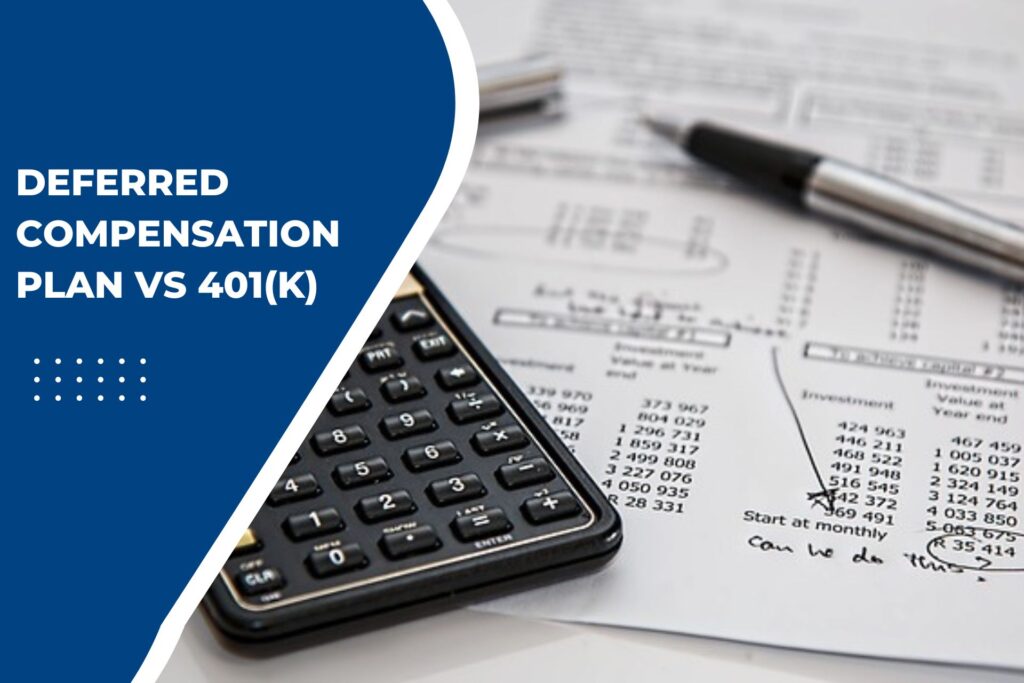When planning for retirement, understanding the nuances between different savings options is essential. Two popular choices are Deferred Compensation Plan vs 401k. Both offer unique benefits and cater to different financial strategies. This article delves deeply into these two retirement savings vehicles, providing a detailed comparison to help you make an informed decision.
Understanding Deferred Compensation Plans
A Deferred Compensation Plan allows employees to defer a portion of their income until a later date, typically retirement. This income deferral can result in significant tax advantages, depending on the individual’s current and future tax brackets.
Types of Deferred Compensation Plans
- Qualified Deferred Compensation Plans: These plans adhere to the Employee Retirement Income Security Act (ERISA) guidelines and include plans like 401(k)s. They offer tax benefits but come with contribution limits and regulatory oversight.
- Non-Qualified Deferred Compensation Plans (NQDC): These plans do not follow ERISA guidelines and are often used by high-earning employees. NQDCs offer more flexibility in terms of contribution limits and payout options but lack the same legal protections as qualified plans.
Benefits of Deferred Compensation Plans
- Tax Deferral: Contributions to a deferred compensation plan are not taxed until they are withdrawn, potentially allowing for significant tax savings.
- Flexibility: Non-qualified plans offer flexibility in terms of contribution amounts and distribution options.
- Income Management: These plans can be tailored to match retirement needs and help manage income during high-earning years.
Risks and Considerations
- Employer Solvency: NQDCs are unsecured and rely on the employer’s financial health. If the company faces financial difficulties, your deferred compensation could be at risk.
- Tax Implications: While tax deferral is a benefit, it requires careful planning to avoid high tax liabilities upon withdrawal.
Understanding 401K Plans
A 401(k) Plan is a qualified retirement savings plan offered by many employers, allowing employees to save and invest a portion of their paycheck before taxes are taken out. Employers often match contributions up to a certain percentage, enhancing the employee’s savings.
Features of 401k Plans
- Tax Advantages: Contributions are made pre-tax, reducing your taxable income for the year. Investments grow tax-deferred until withdrawal.
- Employer Match: Many employers offer a match, which can significantly boost your retirement savings.
- Investment Options: Employees can choose from a variety of investment options, including stocks, bonds, and mutual funds.
Contribution Limits
For 2024, the IRS has set the contribution limit for 401(k) plans at $23,000 for employees under 50. Those aged 50 and above can make an additional catch-up contribution of $7,500, bringing their total limit to $30,500.
Benefits of 401k Plans
- Employer Contributions: The matching contributions from employers provide a substantial benefit that can significantly increase your retirement savings.
- Tax-Deferred Growth: Investments grow without being taxed until you start making withdrawals, typically at retirement.
- Loan Provisions: Some 401k plans allow for loans against your savings, offering financial flexibility in times of need.
Risks and Considerations
- Investment Risk: The value of your 401k is subject to market fluctuations. Poor investment choices can negatively impact your retirement savings.
- Early Withdrawal Penalties: Withdrawing funds before age 59½ typically incurs a 10% penalty, along with taxes.
- Contribution Limits: There are annual limits on how much you can contribute, which may not meet the needs of high-earning individuals.
Want to Know More about 401K Plans?
Click here to Schedule a Free Consultation Today!Deferred Compensation Plan vs 401k : Key Differences
Step by step guide to set up a Defined Benefit Plan
Tax Treatment
- Deferred Compensation Plans: Contributions are not taxed until they are withdrawn, allowing for potential tax savings if you expect to be in a lower tax bracket in retirement.
- 401k Plans: Contributions reduce your taxable income in the year they are made, and taxes are deferred until withdrawal.
Contribution Limits
- Deferred Compensation Plans: NQDCs offer greater flexibility with contribution limits, making them attractive for high earners.
- 401k Plans: Have strict IRS-imposed contribution limits, which can be restrictive for those looking to save more aggressively.
Risk Exposure
- Deferred Compensation Plans: Non-qualified plans are unsecured and depend on the financial health of the employer.
- 401k Plans: Funds are held in trust and are protected, even if the employer faces financial issues.
Employer Involvement
- Deferred Compensation Plans: Often tailored for high-earning employees, with varying levels of employer involvement.
- 401k Plans: Widely offered across various industries, with standardized features and employer matching contributions.
Flexibility
- Deferred Compensation Plans: Offer more flexible distribution options and are not subject to the same early withdrawal penalties as 401ks.
- 401k Plans: While flexible in investment options, they have stricter rules regarding contributions and withdrawals.
Making the Right Choice Deferred Compensation Plan vs 401k
Choosing between a Deferred Compensation Plan vs 401k depends on your financial situation, retirement goals, and risk tolerance. Here are some considerations to help you decide:
For High Earners
- Deferred Compensation Plan: Offers flexibility and higher contribution limits, making it ideal for high-income earners looking to defer a significant portion of their salary.
For Broad Employee Bases
- 401k Plan: With its tax advantages, employer matching, and wide availability, it’s an excellent option for employees across various income levels.
For Risk-Averse Individuals
- 401k Plan: Provides more security with funds held in trust and protections under ERISA guidelines.
For Flexibility Seekers
- Deferred Compensation Plan: Especially non-qualified plans, offer more flexibility in terms of contribution and distribution options.
Conclusion
Both Deferred Compensation Plan vs 401k provide valuable tools for retirement savings. The best choice depends on individual financial circumstances, employment situation, and retirement goals. By understanding the key features, benefits, and risks associated with each, you can make an informed decision that aligns with your long-term financial strategy.


